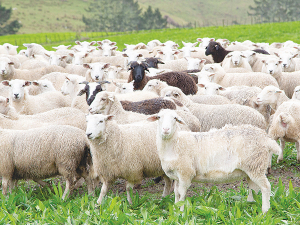State Farmer Delivers Solid Half-Year Result
State farmer Landcorp, trading as Pamu, is a forecasting a full-year net profit of around $100 million.
 Sheep with finer wool, greater tolerance for hot weather, top meat quality traits, as well as lower methane emissions is the goal behind the ‘Sheep of the Future’ programme.
Sheep with finer wool, greater tolerance for hot weather, top meat quality traits, as well as lower methane emissions is the goal behind the ‘Sheep of the Future’ programme.
Sheep with finer wool, greater tolerance for hot weather, top meat quality traits, and lower methane emissions.
That is the vision for Pāmu and its partners who are working on advancing sheep genetics. Pāmu (Landcorp Farming Ltd), the Ministry for Primary Industries (MPI) and Focus Genetics, a Pamū subsidiary, with support from AgResearch, have joined forces on the ‘Sheep of the Future’ programme.
The programme includes finer wool genetics (20-25 micron) sheep that can be farmed beyond the arid areas that have traditionally been the home for Merinos. It also aims for advances in strong wool breeds to increase disease tolerance, low-input traits to make farming less costly, continued breeding selection for animal growth and meat quality traits, and for rumen function with lower levels of methane emission.
The seven-year initiative aims to transform NZ’s sheep-based production systems.
Programme manager Natalie Pickering, from Focus Genetics, says climate change is likely to have a marked impact on NZ farms producing wool and red meat.
“Genetics provides an opportunity to select animals that are better adapted to the changing environment through disease and heat tolerance while maintaining productive performance and lowering emissions.”
The project, partially funded through the Sustainable Food and Fibre Futures fund, is expected to run until 2029. The collaboration will see an injection of $10.5 million – which will enable benchmarking, breed comparisons, research on new traits and breeding programmes to develop fine-wool and no-wool sheep in New Zealand.
At Pāmu’s Aratiatia farm, near Taupō, the team is working with a fine-wool breeding flock alongside a control Romney line. Measurements for production, reproduction, survival, disease and fine-wool attributes are being conducted, along with environmental assessments. The objective is to identify fine-wool attributes suitable for a temperate environment.
“Working with Dr Tricia Johnson, team leader animal genomics at AgResearch, we saw an opportunity to generate a resource to enable us to investigate the genetic variation in the no-wool and fine-wool breeds,” Pickering explains.
“AgResearch has done great work on methane, residual feed intake and genomic selection for the New Zealand sheep industry and we can leverage this work.”
The programme also includes a feasibility study led by AgResearch’s Dr Kathryn McRae, who will explore immune competence in New Zealand sheep. Immune competence is the ability of the animal to mount a healthy immune response following exposure to bacterial or viral infection.
The study aims to define a measurement tool for immune competence that can be incorporated into breeding programmes.
Another part of the project includes producing sheep for sub-tropical areas with a focus on meat production. The team has established a no-wool breeding flock at Pāmu’s Kapiro farm in Kerikeri. There is also a control Romney line to capture data on traits around production, reproduction, survival, disease and no-wool attributes. Researchers will also take emissionsrelated environmental measurements – including residual feed intake and methane outputs. This work stream will result in the development of a method for measuring heat tolerance, which will be a crucial trait as our weather becomes more extreme.
Pāmu’s Jim Inglis says putting the project together has taken three years of planning and preparation to be able to develop novel traits for the benefit of all breeders in New Zealand.
“The fine-wool flocks at Aratiatia and the nowool breeding programmes at Kapiro have now undergone multiple mating cycles. We have good relationships with breeders across New Zealand and internationally which have facilitated their establishment.”
Inglis adds that various breeds have been integrated into the programmes, adding genetic diversity and expanding the scope of the research.
The data generated from this work will flow through New Zealand’s national sheep evaluation programme NProve, managed by Beef+Lamb NZ, and will be available to all farmers.
Inglis claims that the traits measured will also be valuable for strong wool breeders looking to make strong wool farming more profitable and sustainable, and that the team are looking forward to holding open days to discuss the work being done, and how it will fit into farm system changes.
“The programme demonstrates the collective effort of industry stakeholders and researchers committed to shaping the future of sheep-based production systems in New Zealand,” he says.
Dairy Women's Network (DWN) has announced that Taranaki dairy farmer Nicola Bryant will join its Trust Board as an Associate Trustee.
Rural Women New Zealand (RWNZ) says it welcomes the release of a new report into pay equity.
Red meat exports to key quota markets enjoyed $1.4 billion in tariff savings in the 2024-25 financial year.
Remediation NZ (RNZ) has been fined more than $71,000 for discharging offensive odours described by neighbours as smelling like ‘faecal and pig effluent’ from its compositing site near Uruti in North Taranaki.
Two kiwifruit orchards in the Bay of Plenty and one in Northland are this year's finalists for the Ahuwhenua Trophy competition.
The Government's chief science advisor, Dr John Roche says the key objective for the science sector in the coming year is bedding down the reforms which sees the merger of the previous entities.

OPINION: A mate of yours truly reckons rural Manawatu families are the latest to suffer under what he calls the…
OPINION: If old Winston Peters thinks building trade relations with new nations, such as India, isn't a necessary investment in…